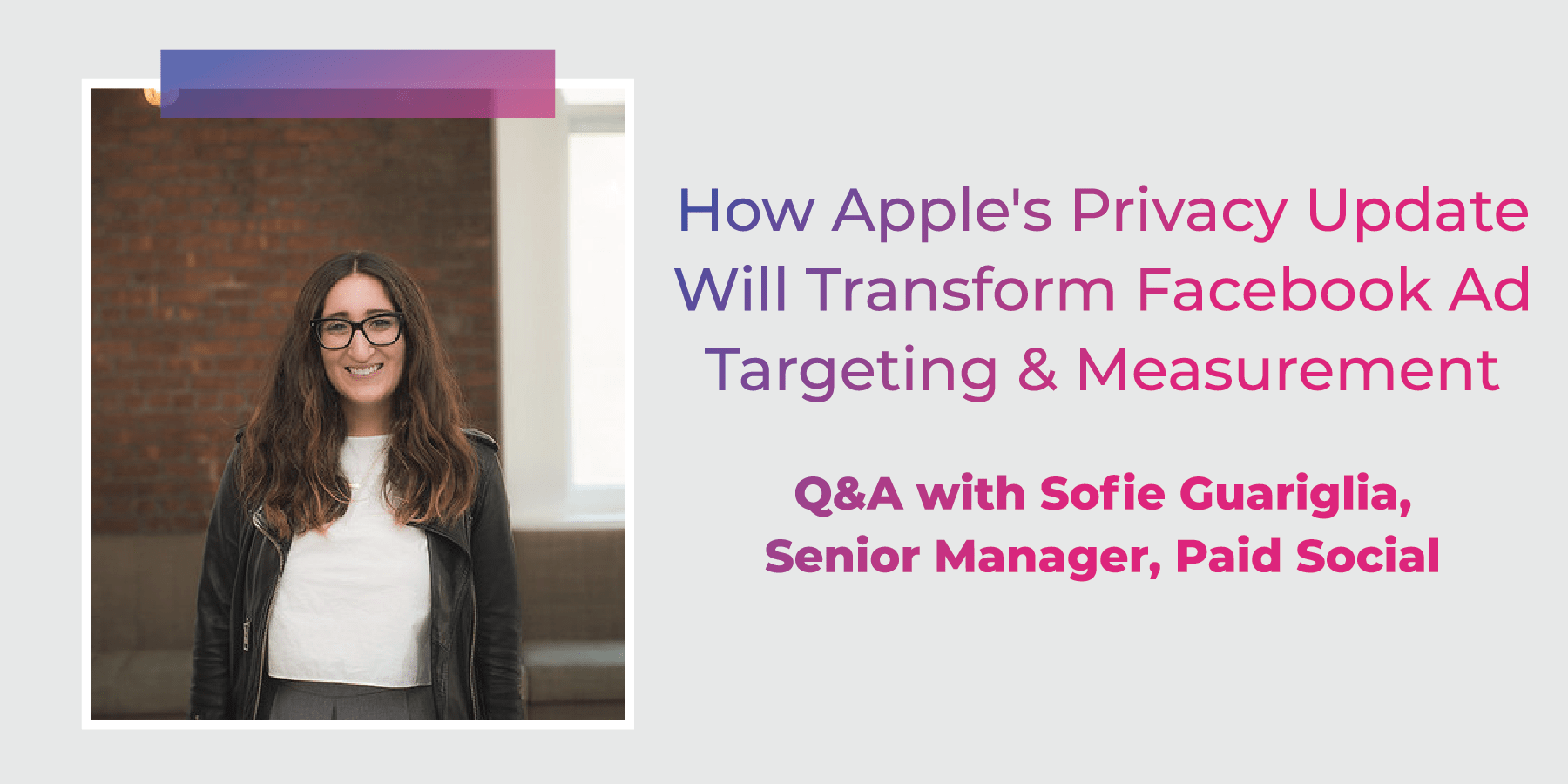Q&A with Sofie Guariglia, Senior Manager, Paid Social – Open Influence
Apple recently announced that the next newest version of iOS will require apps to ask for user permission to track them across apps or websites owned by other companies. Apple is aiming to protect user’s privacy as they reiterate it is a “fundamental human right.” For marketers, this suggests a time of significant change over the horizon. Ad retargeting and Ad measurement on platforms like Facebook will be significantly impacted. So what’s next?!
We talked to our Senior Manager of Paid Social, Sofie Guariglia, about Apple’s iOs 14 update and how it will affect marketers’ ability to target and measure campaign performance.
How does targeting work for Facebook Ads?
Targeting on Facebook has a history of being a bit complicated and controversial! Historically the core targeting types on Facebook have been demographics (age, gender, language etc.), location (as broad as country level or as granular as zip code level), interests (based on the content you interact with on-platform), behaviors (based on off-platform third-party data purchased from companies like Acxiom and Oracle), and website custom audiences that are created using Facebook pixel data in order to re-target customers and create lookalike audiences. In the last few years, the process of leveraging third-party data in paid social or digital ads has become somewhat controversial due to the current political climate, so Facebook made the decision to remove all third-party targeting capabilities late in 2018.
At the moment, Facebook/Instagram targeting really centers around finding users who have expressed interest and/or interact with certain types of content or pages, clicked on certain types of ads, or have purchased or interacted with the Facebook pixel in a specific manner in the past. Any income/purchase level data that cannot be captured with the Facebook pixel will no longer be available to target on the Facebook platform. I’ve also had many clients ask about voice targeting capabilities on Facebook, and although it does seem fishy, the platform has stuck with its position that listening in on users and targeting based on voice-activated keywords is not a part of the Facebook targeting process.
What role do Facebook ads play in influencer marketing? How are ads utilized?
Facebook/Instagram ads can be a great way to get more eyeballs on your organic content, especially with the ever-changing organic algorithm! We typically utilize paid at the end of a campaign to optimize the top-performing organic posts and convert them into dark posts, which allows us to ensure we’re delivering upon our guaranteed impression goals and hitting a very specific target audience in the process. The reporting is also much more robust via paid social vs. organic social, so we can optimize towards lower-funnel KPIs and report out on metrics that aren’t available with organic in-feed posts on Instagram, such as link clicks or conversions.
What are the main shifts that marketers will experience with the new iOS update?
The iOS 14 update has definitely posed a challenge for advertisers who rely heavily on Facebook pixel retargeting data that is captured once the user leaves the Facebook/Instagram platform. The key factor that will affect marketers is the ability for users to now opt out of online data tracking when updating their phones to iOS 14. If the user decides to opt-out of tracking, reaching, and tracking these users once they leave the Facebook/Instagram platform for website conversion based objectives will become increasingly difficult.
Facebook has said although it’s impossible to estimate how many users will opt-out of tracking in their iOS 14 settings, there is a chance pixel audience reach will decrease significantly once the iOS rollout becomes more widespread. This update also applies to any in-app tracking as well, as new iOS 14 users will also be given the same tracking enabling prompt when downloading and updating apps. Although Apple claims this new update is in order to enforce their new policy called ‘AppTrackingTransparency,’ Facebook has taken the stance that the update was made with profitability, not privacy, in mind as a business will now have to rely on in-app purchases to generate revenue, which benefits Apple in the long run. However, many users are excited about the prospect of a privacy feature that will allow their browsing to be protected without fear of being followed around the web.
What do marketers need to keep in mind as they prepare for this shift?
Although there aren’t any statistics that can predict the total impact of iOS 14 before its full rollout, Facebook has stated that without the ability to personalize ads small businesses have seen a 60% cut in over web sales from Facebook ads. If a majority of users decide to opt-out of tracking when downloading iOS 14, advertisers can expect their Facebook pixel audiences to significantly decrease in size making it much harder to reach a portion of their customer base in a more personalized and robust way. Advertisers will still be able to reach users through standard interest, demographic, and location-based targeting, but for those low-funnel sales-based campaigns losing a key portion of your retargeting pool can make a huge impact on the overall business.
What changes do you expect to see on influencer Facebook strategies in relation to the update?
Although influencer marketing campaigns have been largely awareness-based in the past, this has been increasingly changing towards more lower-funnel metrics in the last year with the inclusion of paid social to help hit these lower-funnel sales goals.
As advertisers decide to prioritize web sales and optimize towards objectives like website conversions, Facebook pixel targeting often becomes a key component of the paid social strategy. These types of campaigns will likely see a decrease in retargeting audience sizes and the inability to reach specific users who have opted out of iOS 14 tracking, which could lead to a loss in revenue ultimately. For advertisers who continue to focus on awareness and consideration objectives for their influencer campaigns and do not typically share Facebook pixel access anyway, the iOS 14 update should have little to no immediate impact.
Over the next few months or so as the iOS 14 rollout begins (Apple has not given a specific launch timeline for the anti-tracking feature), advertisers will begin to adapt. There will likely be a decrease in audience reach, tracking, and revenue generation in the short term before a viable tracking alternative is discovered, but as with other updates in the past, advertisers usually find another way to reach users in an engaging way.
To learn more, listen to our podcast Decoding Influence, which covers how Apple’s privacy updates will affect marketers:
—
Social media platforms change rapidly. Stay up to date with the latest trends by visiting our influencer marketing content hub.






